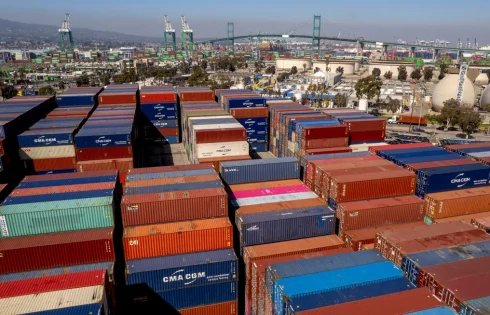
The American consumer is getting worried about the economy.
Economic jitters are showing up across various sentiment surveys as the Trump administration aims to reconfigure America’s trade relationship with the world and inflation shows signs of getting stuck.
The latest evidence comes from The Conference Board’s Consumer Confidence Index for February, released Tuesday morning. The index fell to 98.3, falling for the third-straight month and marking the largest monthly decline since August 2021, as expectations for inflation in the year ahead climbed. That coincides with the trends reflected in the University of Michigan’s consumer survey for February.
Homebuilders are also growing worried, according to the National Association of Home Builders; even US small businesses, which remain somewhat optimistic about deregulation and tax cuts, are in doubt about the economy’s future. The National Federation of Independent Business’ Uncertainty Index rose in January to its third-highest reading on record.
America’s souring economic mood, driven by worries over President Donald Trump’s aggressive approach to tariffs, is a stunning reversal from the (brief) burst of optimism after President Donald Trump’s election in November.
“The fact that consumers don’t feel like it’s smooth sailing — you’ve got one very obvious suspect. That’s the White House, which is sowing uncertainty just about everywhere, whether it comes to trade policy or foreign policy,” Justin Wolfers, economics professor at the University of Michigan, told CNN’s Pamela Brown. “I genuinely understand why consumers are nervous and I hope this doesn’t turn out to be a self-inflicted own goal.”
The Fed and inflation fears
For the Federal Reserve, it’s critical that Americans have faith that inflation will eventually return to normal in the long run. Central bankers pay close attention to people’s perception of prices because they can be self-fulfilling: If Americans expect inflation to pick up, they modify their spending accordingly.
So far, Fed officials in recent speeches haven’t sounded the alarm on inflation expectations. But some have expressed the importance that expectations remain in check.
If Trump’s policies cause inflation to pick up, “it could be appropriate to ignore or look through an increase in the price level if the impact on inflation is expected to be brief and limited,” St. Louis Fed President Alberto Musalem said at a recent event in New York. “However, a different monetary policy response could be appropriate if higher inflation is sustained, or long-term inflation expectations rise.”
“I would be especially concerned by evidence suggesting (inflation expectations) are becoming unanchored,” Musalem said.
Chicago Fed President Austan Goolsbee said Sunday in an interview with News Nation that the run-up in inflation expectations reflected in the University of Michigan’s survey “wasn’t a great number.”
“But it’s only one month of data. You need at least two or three months for that to count,” he said.
Spending plans in an uncertain economy
Sentiment surveys don’t necessarily predict future spending behavior.
For example, when consumer sentiment fell to a record low in June 2022, as inflation reached a four-decade high, Americans continued to spend.
But today’s economic landscape is rife with uncertainty, which may be affecting people’s spending plans, according to a new Wells Fargo survey released Tuesday. About three-quarters of 3,657 adults and 203 teens surveyed across the country said they plan to reduce their spending, citing uncertainty in the economy.
“Consumer behaviors are shifting,” said Michael Liersch, head of advice and planning at Wells Fargo, in a release. “The value of the dollar and what it is providing may not be as predictable anymore, which seems to be more pronounced for younger Americans.”
The survey showed that 82% of Gen Z adults and 79% of Millennials plan to pare back their spending in the coming months. Eating out or food delivery gave respondents the most sticker shock, according to the survey, followed by a tank of gas and prices for concerts or sporting events.
